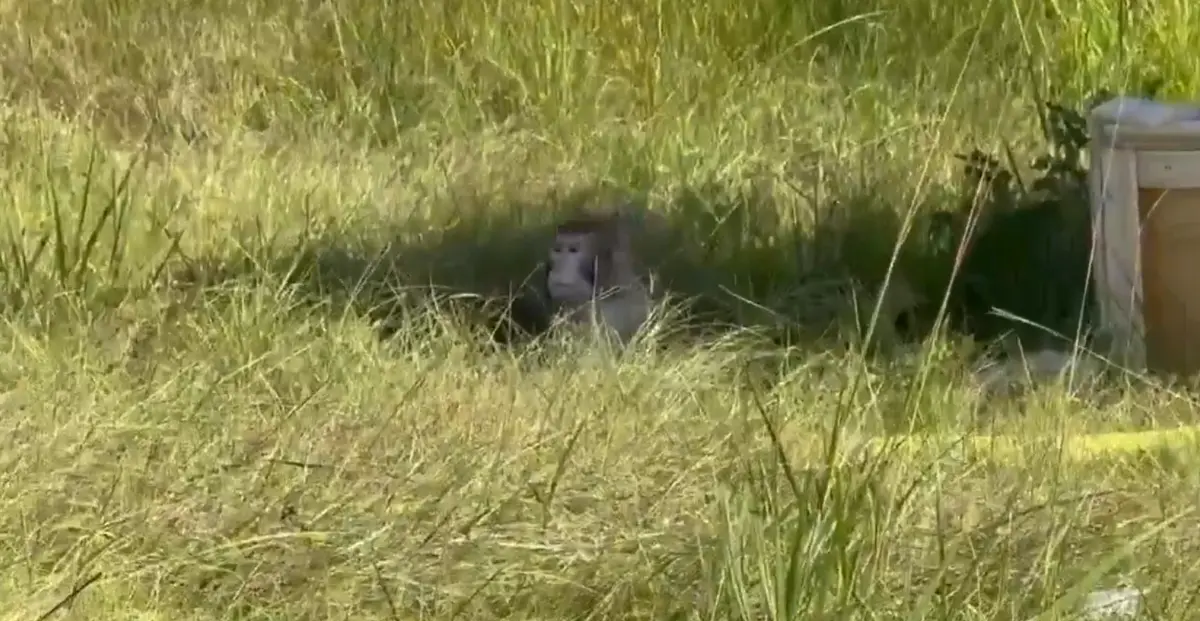Mississippi Highway Crash Leaves Research Monkeys on the Loose

On October 28, 2025, a truck transporting 21 rhesus macaques overturned on Interstate 59 near Heidelberg, Mississippi, approximately 75 miles east of Jackson. Six monkeys initially escaped from damaged transport crates, triggering an emergency response from local authorities and specialists from Tulane University’s National Primate Research Center. The crash occurred near mile marker 117 around 1:30 p.m., according to the Jasper County Sheriff’s Office.
The incident became complicated when the truck driver told law enforcement that the monkeys carried hepatitis C, herpes, and COVID-19. Acting on this information, authorities euthanized several escaped animals as a precautionary measure. However, Tulane University issued a statement later that day clarifying the primates were pathogen-free and had recently undergone health checkups confirming they posed no infectious disease risk. As of October 30, three monkeys remain at large in wooded areas, with ongoing search efforts coordinated by the Mississippi Department of Wildlife, Fisheries and Parks.
Current Situation
Public Safety Warning
DO NOT approach the monkeys. While they pose no infectious disease risk, rhesus macaques can display aggressive behavior toward humans and may bite or scratch if they feel threatened. The animals weigh approximately 40 pounds and require professional handling with protective equipment.
If you spot a monkey: Keep your distance, do not attempt to capture or feed the animal, and immediately report the sighting to 911 or call 1-800-BE-SMART.
The rhesus macaques were being transported from the Tulane National Primate Research Center in New Orleans to other research facilities when the accident occurred. Tulane clarified that the primates belonged to another unnamed entity and were not owned, transported, or in Tulane’s custody at the time of the crash. The university sent animal care experts to assist with recovery efforts.
This incident has drawn attention to primate handling protocols and the transport of research animals on public highways. Animal rights organization PETA released a statement calling the escape an example of risks posed by what it described as the “greedy monkey experimentation industry,” noting that primates face various threats including transport-related incidents.
Incident Location & Search Area
I-59 Mile Marker 117, Heidelberg
Wooded areas surrounding crash site
Tulane NPRC, New Orleans, LA
How Events Unfolded
Sheriff Randy Johnson later stated that the department took “appropriate actions” based on information provided by the truck driver. The initial confusion led to what authorities described as necessary precautionary measures, though the animals were later confirmed to be disease-free. The Mississippi Highway Patrol investigated the crash while multiple agencies coordinated the animal recovery effort.
Rhesus macaques are among the most commonly used primates in biomedical research due to their genetic similarity to humans. The species is frequently transported between facilities for various research purposes. While some primate species face critical endangerment, rhesus macaques are not currently listed as endangered, though their use in research remains controversial among animal welfare advocates.
What We Know About the Incident
- Species: Rhesus macaques (Macaca mulatta)
- Weight: Approximately 40 pounds each
- Health status: Pathogen-free, recently checked
- Ownership: Belonged to unnamed third party
- Transport purpose: Between research facilities
- Origin: From Tulane National Primate Research Center
- Driver incorrectly reported monkeys had hepatitis C, herpes, and COVID-19
- Sheriff’s office acted on this false information
- Led to euthanization of escaped animals
- Tulane corrected the record same day
- Actual risk: Behavioral aggression only, no disease transmission
- Jasper County Sheriff’s Office
- Tulane National Primate Research Center
- Mississippi Department of Wildlife, Fisheries and Parks
- Mississippi Highway Patrol
- Heidelberg Police Department
- Mississippi Department of Transportation
The incident occurs amid ongoing discussions about wildlife transport and handling standards. While the monkeys were being legally transported for research purposes, the crash exposed vulnerabilities in communication protocols between transporters, facilities, and emergency responders. Similar incidents have occurred elsewhere, including a 2022 case in Pennsylvania where cynomolgus monkeys escaped after a truck collision.
Research facilities like Tulane’s National Primate Research Center operate under federal oversight from the National Institutes of Health. These facilities provide primates to other research organizations for studies in areas including infectious diseases, neuroscience, and drug development. The centers maintain strict health monitoring protocols, which is why Tulane was able to confirm quickly that the transported animals were pathogen-free despite the driver’s contrary claims.
Report Sightings Immediately
If you see one of the missing monkeys, maintain a safe distance and contact authorities:
The incident involving escaped research monkeys from a Mississippi highway crash was discussed, covering the October 28 overturning of a transport truck on Interstate 59 near Heidelberg. The event involved 21 rhesus macaques, with six initially escaping and three remaining at large as of October 30, 2025. Information about the misinformation regarding disease status was covered, along with the correction issued by Tulane University.
Details about the ongoing search coordinated by the Mississippi Department of Wildlife, Fisheries and Parks and local authorities were provided. The public safety advisory to avoid approaching the animals and report sightings to emergency services was noted. Information about primate behavior and research was included for context. The situation remains unresolved with recovery efforts continuing.


















